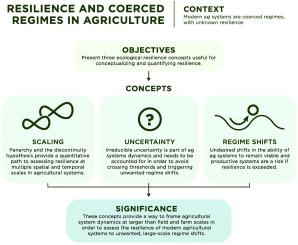Agricultural Systems ( IF 6.1 ) Pub Date : 2023-01-31 , DOI: 10.1016/j.agsy.2023.103612 Shana M. Sundstrom , David G. Angeler , Craig R. Allen

|
There is uncertainty regarding the resilience of modern intensive agricultural systems, given that they have been developed recently in history (post-WWII). Historically, agricultural sciences have focused on scales from the molecular and plant to plot and field. Innovation in this space has led to increased efficiency in agricultural production at local scales, but it remains a challenge to scale up such knowledge to explain dynamics in soil, water, nutrients, and biodiversity at larger spatial and temporal scales, or to account for complex interactions and feedbacks. We present agricultural systems as coerced regimes, and then discuss three underutilized resilience concepts relevant for investigations of agricultural systems as multi-scaled complex adaptive systems (CASs): scales, uncertainty, and regime shifts. Framing agricultural systems as coerced regimes situates them according to their degree of self-organization, the impact on resilience, and the possibility of alternative regimes. Collectively, these resilience concepts offer a path forward for evaluating the resilience of modern agriculture systems and expanding agroecological principles to scales beyond that of the field or farm because they explicitly account for agricultural systems as multi-scaled complex adaptive systems. This knowledge base has immediate management implications from the farm to continental scale, as climate and land use change force challenging decisions regarding the ability of modern agriculture to persist as is, adapt, or transform in order to avoid undesirable regime shifts.
中文翻译:

农业的韧性理论和强制韧性
现代集约化农业系统的复原力存在不确定性,因为它们是最近才发展起来的(二战后)。从历史上看,农业科学一直关注从分子和植物到地块和田地的尺度。这一领域的创新提高了地方规模的农业生产效率,但要扩大此类知识以解释更大空间和时间尺度的土壤、水、养分和生物多样性的动态,或解释复杂的因素,仍然是一个挑战互动和反馈。我们将农业系统呈现为强制制度,然后讨论与农业系统作为多尺度复杂适应系统 (CAS) 的调查相关的三个未充分利用的弹性概念:尺度、不确定性和制度转变。将农业系统构建为强制性制度,根据它们的自组织程度、对恢复力的影响以及替代制度的可能性来定位它们。总的来说,这些复原力概念为评估现代农业系统的复原力和将农业生态学原则扩展到田地或农场以外的规模提供了一条前进的道路,因为它们明确地将农业系统视为多尺度的复杂适应系统。该知识库对从农场到大陆规模的管理具有直接影响,因为气候和土地利用变化迫使人们做出关于现代农业保持原样、适应或转变以避免不受欢迎的制度转变的能力的决策。对复原力的影响,以及替代制度的可能性。总的来说,这些复原力概念为评估现代农业系统的复原力和将农业生态学原则扩展到田地或农场以外的规模提供了一条前进的道路,因为它们明确地将农业系统视为多尺度的复杂适应系统。该知识库对从农场到大陆规模的管理具有直接影响,因为气候和土地利用变化迫使人们做出关于现代农业保持原样、适应或转变以避免不受欢迎的制度转变的能力的决策。对复原力的影响,以及替代制度的可能性。总的来说,这些复原力概念为评估现代农业系统的复原力和将农业生态学原则扩展到田地或农场以外的规模提供了一条前进的道路,因为它们明确地将农业系统视为多尺度的复杂适应系统。该知识库对从农场到大陆规模的管理具有直接影响,因为气候和土地利用变化迫使人们做出关于现代农业保持原样、适应或转变以避免不受欢迎的制度转变的能力的决策。这些复原力概念为评估现代农业系统的复原力和将农业生态学原则扩展到田地或农场以外的规模提供了一条前进的道路,因为它们明确地将农业系统视为多尺度的复杂适应系统。该知识库对从农场到大陆规模的管理具有直接影响,因为气候和土地利用变化迫使人们做出关于现代农业保持原样、适应或转变以避免不受欢迎的制度转变的能力的决策。这些复原力概念为评估现代农业系统的复原力和将农业生态学原则扩展到田地或农场以外的规模提供了一条前进的道路,因为它们明确地将农业系统视为多尺度的复杂适应系统。该知识库对从农场到大陆规模的管理具有直接影响,因为气候和土地利用变化迫使人们做出关于现代农业保持原样、适应或转变以避免不受欢迎的制度转变的能力的决策。











































 京公网安备 11010802027423号
京公网安备 11010802027423号